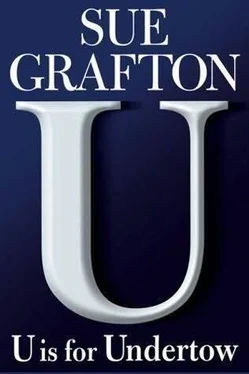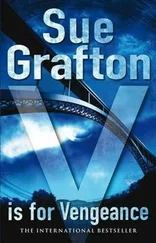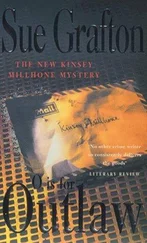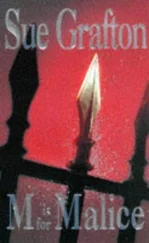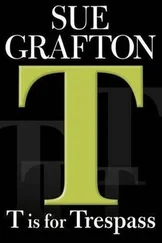I’ve been his tenant for the past eight years. At one time, my studio was Henry’s single-car garage. He decided he needed a larger one to accommodate his station wagon and his pristine 1932 five-window coupe, so he converted the original garage to a rental unit, which I’d moved into. An unfortunate explosion had flattened my apartment six years before, so Henry had redesigned the floor plan, adding a half-story above the kitchen. On the ground floor I have a living room with a desk and a sofa bed that can accommodate overnight guests. The kitchen is small, a galley-style bump-out off the living room. There’s also a bathroom and a combination washer-dryer tucked under the spiral stairs. The whole of it resembles the interior of a small boat, lots of highly polished teak and oak, with a porthole in the front door and nautical blue captain’s chairs. The new loft, in addition to a double bed, boasts built-in cubbyholes, as well as a second bathroom with a view that includes a small slice of the Pacific Ocean visible through the trees. Henry had installed a Plexiglas skylight above my bed, so I wake to whatever weather’s drifted in during the night.
Between the studio and Henry’s house there’s a glassed-in passageway where he proofs batches of bread, using a Shaker cradle like an enormous buttered bowl. In his working days, he made his living as a commercial baker, and he still can’t resist the satiny feel of newly kneaded dough.
At 5:29 I grabbed my shoulder bag, crossed the flagstone patio, and tapped on the glass pane in Henry’s back door. Most of the time he leaves it unlocked, but our unspoken agreement is to respect each other’s privacy. Unless my apartment was in flames, he’d never dream of entering without permission. I peered through the glass and saw Henry standing at the sink, filling it with hot water into which he was squeezing a long shot of liquid detergent. He took three steps to the side to open the door and then returned to his task. I could see numerous place settings of tarnished silverware on the counter with a roll of aluminum foil and a clean towel laid out. He’d set an eight-quart pan on the stove and the water had just reached a rolling boil. On the bottom of the pan there was a crumpled section of foil. I watched him add a quarter cup of baking soda, after which he placed the silverware in the bubbling water with the foil.
“Oh yum. A pot of flatware soup.”
He smiled. “When I pulled the silver from the canteen, most of it was tarnished. Watch this.”
I peered into the boiling water and watched as the foil turned dark and the tarnish disappeared from all the forks, knives, and spoons. “That doesn’t do any harm?”
“Some people think so, but anytime you polish silver, you’re removing a thin layer of oxidation. That’s a Towle pattern, by the way. Cascade. I inherited service for eighteen from a maiden aunt who died in 1933. The pattern’s discontinued, but if I haunt garage sales, I can sometimes find a piece.”
“What’s the occasion?”
“Silver’s meant to be used. I don’t know why I hadn’t thought of it before. It lends a meal an air of elegance, even when we’re eating in here.” He poked the silverware with a set of tongs, making sure all the pieces were totally submerged. “I put an open bottle of Chardonnay in the refrigerator for you.”
“Thanks. Will you be having some with dinner?”
“As soon as I finish this.”
He paused to take a swallow of the Black Jack over ice that constitutes his usual late-afternoon pick-me-up. I retrieved the Chardonnay, took two wineglasses from the cupboard, and filled mine halfway. Henry, meantime, was using the tongs to move the silver from the kettle to the sink of soapy water. After a quick rinse, he laid the freshly polished silver on the waiting towel. I took a second towel from the linen drawer and dried the pieces; I set places for two at the kitchen table, where Henry had laid out freshly ironed cloth napkins and mats.
We postponed our conversation about the job until we’d each eaten two servings of beef stew. Henry crumbled corn bread in his, but I preferred mine on the side with butter and homemade strawberry jam. Am I in love with this man or what? When we finished our meal, Henry put the dishes and silverware in the sink and returned to the table.
Once he was settled, I gave him the Reader’s Digest condensed version of the story Michael Sutton had related to me. I said, “Where have I heard the name Michael Sutton? Does it mean anything to you?”
“Not offhand. You know what his father does for a living?”
“Not much. He’s deceased. Sutton told me both his parents were gone. He’s got two brothers and a sister, but they’re not on speaking terms. He didn’t explain himself and I didn’t ask.”
“I wonder if his father was the Sutton who served on the city council. This was maybe ten years ago.”
“That I don’t know. I suspect the reference will come to me, if there is one.”
“In the meantime, you have a game plan?”
“I’ve got some ideas percolating at the back of my brain. I want to see what the papers have to say about the Fitzhugh girl. Sutton might have forgotten something relevant or embellished where he should have left well enough alone.”
“You don’t trust him?”
“It’s not that. I’m worried he’s conflating two separate events. I believe he saw two fellows digging a hole. What I question is the connection to Mary Claire’s disappearance. He says the dates line up, but that doesn’t count for much.”
“I guess time will tell. So what’s the other one?”
“The other what?”
“You said there was another issue up for grabs.”
“Oh, that.”
I leaned toward the empty chair where I’d placed my shoulder bag. I retrieved the still-sealed envelope and passed it across the table. “I don’t have the nerve to open it. I thought you could peek and tell me what it is.”
He put on his reading glasses and studied the front and back of the envelope in the same way I had. He slid a finger under the flap and lifted it, then removed a card with an overleaf of tissue. Inside, there was a smaller card with a matching envelope, so the recipient could RSVP. “Says, ‘The Parsonage. Groundbreaking and Dedication Ceremony, celebrating the removal of the Kinsey Family Homestead to its new location at…’ blah, blah, blah. May 28, 1988. I believe that’s the Saturday of Memorial Day weekend. Four P.M. Cocktails and dinner to follow at the country club. Very nice.”
He turned the invitation so it faced me and I could read it for myself. “Big family do,” he said. “Doesn’t say black tie optional, so that’s good news.” He picked up the smaller card with its stamped envelope. “They’d appreciate a reply by May 1. Couldn’t be easier. The envelope’s already stamped so that will save you return postage. Well, now, what do you think of that?”
“This is just not going to go away, is it?” I said. “Why do they keep harassing me? It’s like being nibbled to death by ducklings.”
He pulled his reading glasses down low on his nose and looked at me over the rims. “Two contacts a year isn’t ‘harassment.’ This is an invitation to a party. It’s not like someone put dog turds on the front seat of your car.”
“I barely know these people.”
“And you won’t if you keep avoiding them.”
Reluctantly, I said, “I’ve dealt with Tasha and she’s not so bad. And I’m fond of Aunt Susanna. She’s the one who gave me the photograph of my mother and then sent me the family album. I’ll admit I was touched by that. So here’s what worries me. Am I just being stubborn for the sake of it? What do they call that, ‘cutting off your nose to spite your face’? I mean, most families want to be close. I don’t. Does that make me wrong?”
Читать дальше
